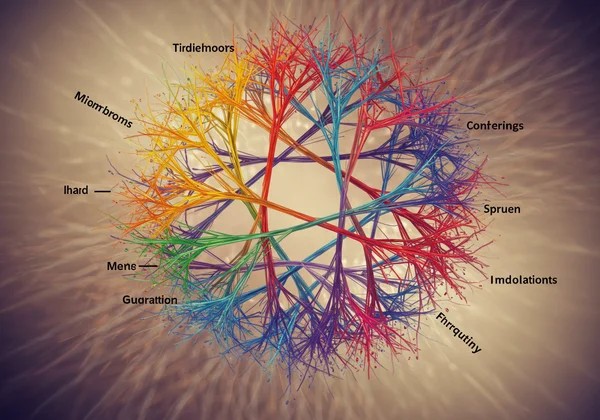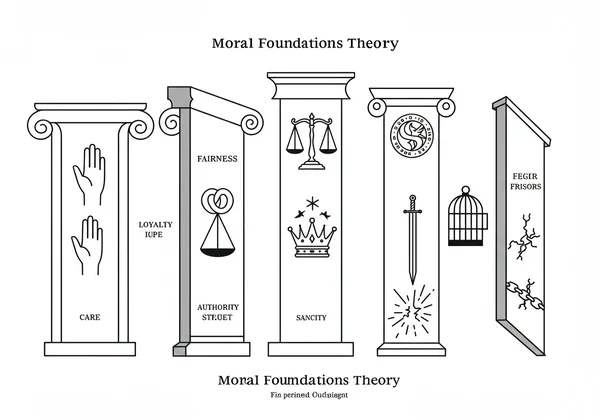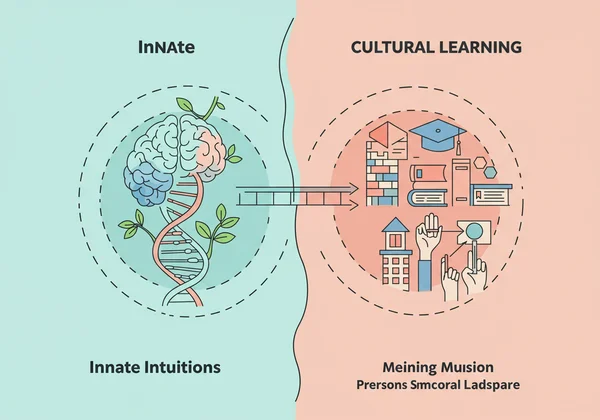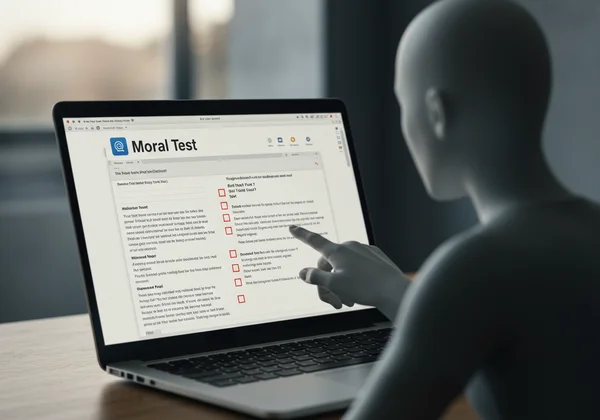Prueba Moral: Tu Brújula Ética y la Teoría de los Fundamentos Morales
July 13, 2025 | By Julian Croft
¿Alguna vez te has preguntado qué guía realmente tus decisiones? ¿Qué es una prueba moral y cómo te ayuda a comprenderte a ti mismo? Descubrir tu brújula ética es crucial para navegar las complejidades de la vida y tomar decisiones alineadas con tus valores más profundos. Esta guía profundiza en la Teoría de los Fundamentos Morales, un marco científico que ayuda a explicar las raíces psicológicas de tus juicios e intuiciones morales. Proporciona una comprensión profunda de tu ser ético, permitiéndote explorar tu panorama ético único. Para embarcarte en este viaje de autodescubrimiento, considera realizar una evaluación gratuita en línea para encontrar tu núcleo ético.
Comprendiendo la Teoría de los Fundamentos Morales (TFM)
La Teoría de los Fundamentos Morales (TFM) ofrece una lente fascinante a través de la cual ver la moralidad humana. Este concepto ofrece una forma profunda de comprender los principios que guían tus creencias. Comprender la TFM puede arrojar luz sobre por qué las personas tienen puntos de vista muy diferentes sobre temas políticos, sociales y personales.

¿Qué es la Teoría de los Fundamentos Morales? sus Orígenes y Propósito
La Teoría de los Fundamentos Morales fue desarrollada por los psicólogos sociales Jonathan Haidt, Craig Joseph y Jesse Graham. Su trabajo surgió de la observación de que los juicios morales a menudo provienen de reacciones rápidas e intuitivas en lugar de deliberaciones lentas y racionales. La teoría propone que el razonamiento moral humano se basa en un pequeño conjunto de "fundamentos" o "módulos" morales innatos y universales. Estos fundamentos son como receptores mentales profundamente arraigados que responden a preocupaciones morales específicas. Si bien estos fundamentos son universales, las culturas y los individuos los priorizan de manera diferente, lo que lleva a sistemas morales diversos. El propósito de la TFM es proporcionar un marco para comprender y mapear estas intuiciones morales subyacentes, ayudándonos a comprender el vasto espectro de la moralidad humana.
Los Seis Pilares: Explorando los Fundamentos Morales Centrales
La TFM identifica seis fundamentos morales fundamentales, cada uno respondiendo a una preocupación específica y proporcionando una base para el juicio moral:

- Cuidado/Daño: Este fundamento se centra en proteger a las personas vulnerables y prevenir el sufrimiento. Es la base de virtudes como la compasión y la amabilidad.
- Justicia/Engaño: Centrado en la justicia, la igualdad y la proporcionalidad. Fomenta preocupaciones sobre los derechos, la reciprocidad y la garantía de que las personas reciban lo que les corresponde.
- Lealtad/Traición: Este fundamento enfatiza la cohesión grupal, el patriotismo y el autosacrificio por la comunidad o nación. Implica deberes hacia el propio grupo.
- Autoridad/Subversión: Este fundamento se relaciona con la jerarquía, el respeto por la tradición y la obediencia a la autoridad legítima. Es la base de virtudes como la deferencia y el orden.
- Santidad/Degradación: Arraigado en conceptos de pureza, sacralidad y evitar la contaminación o la profanación. A menudo se manifiesta en preocupaciones sobre la higiene, la espiritualidad y la protección de lo sagrado.
- Libertad/Opresión: Este fundamento defiende la libertad y la resistencia a la dominación o la coerción. Se centra en el deseo de liberarse de aquellos que restringirían los propios derechos.
Estos pilares representan los bloques de construcción fundamentales de nuestros marcos éticos, influyendo en todo, desde las elecciones personales hasta las normas sociales.
Cómo se Forman las Morales y Moldean tu Brújula Ética
¿Cómo se forman realmente las morales? Es una fascinante combinación de nuestras tendencias innatas y la poderosa influencia de nuestro entorno. Es un viaje que moldea nuestra brújula ética personal y determina cómo navegamos por el mundo.
Intuiciones Innatas vs. Aprendizaje Cultural: La Doble Influencia
Nuestro panorama moral es una fascinante combinación de naturaleza y crianza. La TFM sugiere que, si bien nacemos con estas sensibilidades morales fundamentales —como una aversión intuitiva al daño o una preferencia por la justicia— su desarrollo y priorización están fuertemente influenciados por el aprendizaje cultural. Desde la infancia, la familia, la educación y las narrativas sociales nos enseñan qué valores enfatizar y cómo aplicar estos fundamentos a situaciones específicas. Por ejemplo, si bien el fundamento del "Cuidado" es universal, lo que constituye "cuidado" o "daño" puede variar ampliamente entre culturas. Esta doble influencia significa que tu perfil moral único es un interjuego dinámico entre tus predisposiciones inherentes y las lecciones que has absorbido a lo largo de tu vida. Es por eso que una prueba de moralidad en línea puede proporcionar información tan fascinante.

Navegando Dilemas Cotidianos con tu Marco Ético
Tu marco ético, construido sobre estos fundamentos morales, actúa como una guía poderosa en la vida cotidiana. Piensa en cómo reaccionas ante una noticia, un conflicto personal o una decisión en el trabajo. Tu instinto, tu juicio inmediato, es a menudo un eco de estos fundamentos subyacentes. Por ejemplo, si tu fundamento de "Justicia" está muy desarrollado, podrías reaccionar instintivamente con fuerza ante injusticias percibidas. Si la "Lealtad" es una piedra angular, podrías priorizar la armonía del grupo. Comprender qué fundamentos son más prominentes para ti puede ayudarte a afrontar conscientemente los dilemas cotidianos. Te permite anticipar tus propias reacciones y comprender las posturas éticas de los demás, fomentando una mayor empatía y una toma de decisiones más considerada. Puedes explorar tu marco realizando una prueba de valores morales.
Psicología Moral: Desentrañando tus Juicios Morales
El campo de la psicología moral explora los fascinantes procesos cognitivos y emocionales que impulsan nuestros juicios morales. Profundiza en el "por qué" detrás de lo que percibimos como correcto o incorrecto, arrojando luz sobre el intrincado funcionamiento de la mente humana.
El Papel de la Emoción y la Razón en la Toma de Decisiones Morales
Cuando nos enfrentamos a un dilema ético, rara vez es un proceso puramente racional. La psicología moral destaca el papel significativo tanto de la emoción como de la razón en la toma de decisiones morales. A menudo, nuestros juicios morales iniciales son respuestas emocionales rápidas y automáticas – un "instinto". Por ejemplo, ver a alguien sufrir activa inmediatamente nuestro fundamento de Cuidado emocionalmente. Posteriormente, la razón interviene para justificar o racionalizar estas reacciones emocionales iniciales, a veces incluso construyendo argumentos elaborados para apoyarlas. Comprender esta interacción es clave para desentrañar tus juicios morales. Nos muestra que nuestra ética no se trata solo de principios lógicos, sino que también está profundamente entrelazada con nuestras experiencias e intuiciones emocionales.
Por Qué los Fundamentos Morales Diversos Conducen a Diferentes Visiones del Mundo
Una de las ideas más profundas de la TFM es cómo diferentes ponderaciones de estos fundamentos morales conducen a visiones del mundo muy diferentes. Considera un debate político: una persona podría priorizar el "Cuidado" y la "Justicia", abogando por programas de bienestar social y igualdad. Otra podría valorar mucho la "Lealtad" y la "Autoridad", enfatizando la seguridad nacional y las instituciones tradicionales. Ninguna es intrínsecamente "incorrecta", pero sus brújulas morales simplemente están orientadas de manera diferente. Reconocer esta diversidad en los fundamentos morales puede fomentar una mayor comprensión y reducir conflictos. Nos ayuda a ver que los desacuerdos no siempre se deben a malicia, sino a menudo a prioridades morales fundamentales diferentes. Esta autoconciencia se puede cultivar a través de una prueba de evaluación moral robusta.
Aplicando la TFM: Realiza Nuestra Prueba Moral Gratuita para Descubrir Tus Fundamentos
Ahora que comprendes el poderoso marco de la Teoría de los Fundamentos Morales y cómo se forman las morales, podrías estar ansioso por aplicar este conocimiento a ti mismo. Aquí es donde nuestra plataforma interviene, ofreciendo una oportunidad única para obtener información personalizada sobre tu propia composición ética.
La Ciencia Detrás de la Evaluación Ética de Moraltest.org
Nuestra prueba moral proporciona una evaluación de vanguardia desarrollada por un equipo dedicado de expertos en ética, psicólogos y expertos en IA. Nuestra evaluación ética no es solo un cuestionario informal; está diseñada basándose en décadas de investigación en psicología moral y marcos éticos, garantizando su fiabilidad y validez. Te presentamos escenarios que invitan a la reflexión y que desafían tu razonamiento moral, reflejando dilemas éticos del mundo real, desde la vida cotidiana hasta cuestiones complejas en IA y ciudadanía digital. Los algoritmos analizan tus respuestas frente a modelos éticos establecidos, ofreciendo una instantánea de tus tendencias morales primarias. Este compromiso con el rigor científico garantiza que la información que recibes sea significativa y aplicable, ayudándote a descubrir verdaderamente tu brújula moral.

Obtén Información Personalizada sobre Tu Núcleo Ético
Realizar nuestra prueba de moralidad en línea gratuita es el primer paso para desbloquear una comprensión más profunda de ti mismo. Recibirás un resumen instantáneo de tu perfil moral, destacando tus principales inclinaciones éticas. Pero el viaje no tiene por qué terminar ahí. Para aquellos que buscan una autorreflexión aún más profunda, ofrecemos un informe de análisis personalizado opcional y detallado impulsado por IA. Este informe mejorado va más allá de las simples puntuaciones, proporcionando información sobre tus fortalezas, desafíos potenciales y planes de acción concretos para el desarrollo personal. Es una oportunidad para profundizar en tu núcleo ético con una claridad sin precedentes, guiándote hacia una toma de decisiones más responsable y satisfactoria. ¿Listo para empezar? Comienza tu prueba moral gratuita hoy mismo.
Embarcándote en Tu Viaje Ético
Comprender tu brújula ética a través de marcos como la Teoría de los Fundamentos Morales es más que un ejercicio académico; es un paso vital hacia el crecimiento personal y la toma de decisiones responsable. Al reconocer las intuiciones innatas y los valores aprendidos que dan forma a tus juicios morales, obtienes una profunda autoconciencia y una perspectiva más clara del diverso mundo que te rodea.
Te animamos a embarcarte en este viaje de autodescubrimiento ético. Realiza la prueba moral gratuita en nuestro sitio y obtén información personalizada sobre tu núcleo ético. Es un paso empoderador para comprender cómo se forman las morales y encontrar verdaderamente tu lugar único en el complejo tapiz de la moralidad humana. Visita nuestro sitio para explorar tu ética y comenzar tu transformación.
Preguntas Frecuentes Sobre Pruebas Morales y Valores
¿Qué es una prueba moral y cómo me ayuda a comprenderme a mí mismo?
Una prueba moral es una evaluación diseñada para ayudarte a explorar tu razonamiento y valores éticos al presentarte diversos dilemas éticos. Al analizar tus respuestas, proporciona información sobre tus inclinaciones morales primarias y los principios fundamentales que guían tus decisiones. Esta autoevaluación puede revelar qué fundamentos morales (como el Cuidado, la Justicia o la Lealtad) son más prominentes para ti, ayudándote a comprender tus reacciones a diferentes situaciones y fomentando una mayor autoconciencia. Puedes realizar la prueba en nuestra plataforma para obtener un informe personalizado.
¿Cómo descubro mis morales y valores?
Comprender tus morales y valores implica un proceso de autorreflexión y observación. Participar en escenarios que invitan a la reflexión, como los que se encuentran en una prueba de valores morales, puede revelar tus inclinaciones naturales. Prestar atención a lo que te molesta profundamente, lo que defiendes instintivamente o lo que te inspira también puede proporcionar pistas. La Teoría de los Fundamentos Morales ofrece una forma estructurada de categorizar estas inclinaciones, haciendo el proceso más claro. Nuestra plataforma proporciona una herramienta científicamente respaldada para descubrir tus valores y obtener información profunda.
¿Cuáles son los fundamentos morales primarios según la teoría?
Según la Teoría de los Fundamentos Morales, existen seis fundamentos morales primarios: Cuidado/Daño (proteger a los demás), Justicia/Engaño (justicia e igualdad), Lealtad/Traición (cohesión grupal), Autoridad/Subversión (respeto por la jerarquía), Santidad/Degradación (pureza y sacralidad), y Libertad/Opresión (libertad de la coerción). Se cree que estos fundamentos son bloques de construcción intuitivos universales de la moralidad humana, aunque su importancia varía enormemente entre individuos y culturas.
¿Cómo puede la comprensión de mi brújula ética mejorar mis decisiones?
Comprender tu brújula ética te permite tomar decisiones más intencionales y consistentes. Cuando sabes qué fundamentos morales son los más influyentes para ti, puedes anticipar tus reacciones a los desafíos éticos y evaluar conscientemente si tus elecciones se alinean con tus valores fundamentales. Esta autoconciencia te ayuda a navegar situaciones complejas con mayor claridad, resolver conflictos internos y fomentar una comunicación más efectiva y empatía con aquellos que pueden tener prioridades morales diferentes. Tómate un momento para acceder a tus ideas éticas hoy mismo.